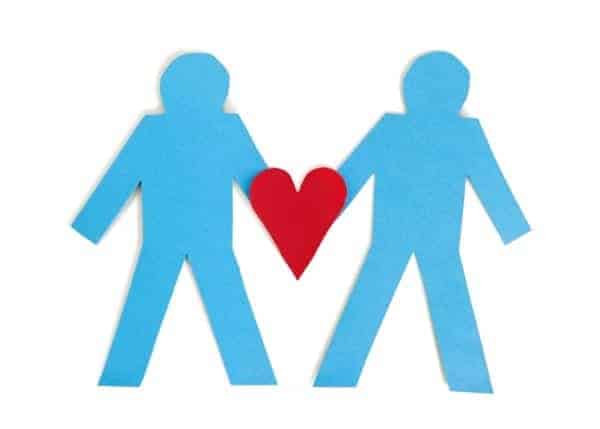Dating and finding a partner for heterosexual people is not that easy. for homosexuals it is much more difficult to find a suitable partner for a long-term relationship.
Being gay brings a new level of complexity into the game. Perhaps this may be because as men we are better able to put ourselves in the shoes of our counterparts because they are also men.
Put the other way around, do the differences between men and women make the dating process easier? Difficult to say.

The development process for discovering one's own sexuality is certainly different than for heterosexual people.
For many gays , this is often not completed even in adulthood because it is perhaps only much later that they discover their sexual preference, come to terms with it and begin to live it out.
I definitely don't want to use clichés and stereotypes with this article and even if I may be generalizing a little at one point or another, I would like to emphasize that I am very aware that every person is different and their individual situation can be different .
For the sake of simplicity, I would like to highlight the 10 most common obstacles and difficulties in dating among gay men , which I have observed most frequently through conversations and the evaluation of forum and community posts.
1. Different stages of coming out
When it comes to coming out, it takes place at different stages of life and the type and extent are also very different. Some come out during puberty and are open about their sexual orientation right from the start.
Others don't realize it until much later, or they were unsure or wanted to avoid social pressure. Therefore, coming out happen even at an old age.
Then every man handles it differently to whom he comes out - only to the closest family or friends, or to colleagues or completely publicly. This makes dating more difficult when the potential partner is at a completely different stage.
For example, if you openly live as a gay man and date a man who hides his homosexuality from his family and friends, then this can quickly lead to conflicts.
In times of omnipresent cell phone cameras and social media, it can be extremely difficult to have such a relationship without your family or friends noticing.

Photo by Christian Buehner @christianbuehner, via Unsplash
In order to give the relationship a chance, you should have an open dialogue about whether it might be better or even necessary to help your partner show their sexual orientation to the outside world. This is undoubtedly an extremely difficult step, especially towards your own family or friends.
After all, no one can predict the reaction in advance. It can lead to complete rejection. But the reaction could just as easily be much more positive. Or the people around him simply need time to come to terms with it.
Coming out is therefore fraught with risks, but for a fulfilling relationship it is essential that both partners are open about their homosexuality and each other. Otherwise, a long-term relationship has very little chance.
2. There is too much focus on sex
If you move around the gay scene , it quickly becomes clear how easy it is to find sex partner This is probably due to the fact that libido is generally high in men and testosterone levels seem to play a big role.
When dating men, this testosterone is present twice and this sometimes leads to a stronger sexual drive . The erotic stimuli present everywhere do the rest to further fuel the fire.
With the app dating culture and dating platforms like gay roeal, the rapid exchange of sexual partners among men has reached a new level.
Another factor is certainly the fact that many gays were initially able to suppress, hide or only live out their sexuality with great inhibition. Once you come out, it can feel like a liberation and lead to disinhibited behavior.
Of course, that's not a bad thing in itself. But the increased search for physical satisfaction is not always what it seems.
Sometimes it can also hide a subconscious desire and need to fill an emptiness within yourself. Fast sex can feel very good. However, it cannot replace the fulfillment and deep satisfaction of a long-term, happy relationship .
For this reason, it may be advisable to take a closer look at your actual needs honestly and openly and to listen to yourself. What do I really want? What makes me happy?
Only if you know yourself and your true needs can you find someone with whom you can fulfill them.
3. Problems with your own identity
Being gay is often confusing. There is neither the right nor the wrong way. As a rule, gays grow up in a strongly heterosexual world and they first have to find themselves and then their place in it.
A lot of insecurities, doubts, shame and resistance have to be overcome. Often you don't have a male point of reference that shows you an appropriate approach to your own sexuality.
So you are often left alone with it and it requires a lot more emotional and psychological work than with heterosexual contemporaries.
Important questions need to be answered in order to live a happy life. Who am I? Who do I want to be? Who am I attracted to? What role does a long-term partnership or marriage play for me? What partnership goals do I have? Would I like to have children of my own? Do I want monogamous ? Can I commit permanently?
As a gay man, you have far fewer points of reference in your environment and our society itself. Values, conventions and boundaries often have to be worked out hard and then change frequently.
4. Emotional wounds
For the reasons mentioned in the last point and the fact that homosexuals are still not fully accepted in our society and are often exposed to hostility, it is not surprising that deep, emotional wounds can arise as a result.
It starts when you grow up, when you constantly have to hide parts of your own personality or you are constantly perceived as “different” or even treated as a marginal figure. In other cultures it is much worse.
This can lead to severe problems in personality development and prevent or at least hinder a natural and healthy approach to one's own identity and sexuality.
You have been hurt many times in the past and this leads to a great fear of being hurt again.
Exclusions, hostility and stigmatization cause you to build up barriers, close yourself internally and become numb. Once the walls around yourself are high, it becomes difficult for a partner to break them down again.
It is important to have a realistic view of these circumstances, even if it can be painful. Only if both partners are honest with themselves and with each other can they tear down the walls together, brick by brick, and thus build a trusting and stable relationship.
5. Inflated expectations
It's not just a rumor that gays can be extremely picky. This has increased enormously with the advent of Internet dating, numerous cell phone apps and social media such as Facebook, Instagram and Co. As a gay man, it's easy to get the impression that the pool of candidates and the opportunities to get to know other gays are inexhaustible.
If you take Tinder as a prominent example, if you don't like it, the candidate is eliminated with a swipe and the next one is ready with a wave of the hand.

The abundance of contact options gives you the feeling that you can always find a better partner. This basic feeling is of course like poison for a serious partner search.
Gays are men with egos who usually strive for the best in everything. This may also be because they learned during their childhood and growing up to compensate for their difference.
This constant striving for perfection can lead to us having excessive expectations of ourselves and therefore also indirectly of a potential partner.
Television, magazines and the media in general end up cementing these expectations by giving the impression that everyone has to look like a model, have a toned beach body, be extremely successful and also come across as intelligent, funny and charming.
It can help here to work on your own expectations. This will certainly have a positive impact on the chances of success in a serious and long-term relationship.
6. Big age differences
Basically, it's a nice circumstance when age differences between two partners don't play a big role. And here gays seem to be a big step ahead of their heterosexual counterparts.
However, it can cause problems if the age difference is too obvious. For example, if the partners have been separated for more than 15 years, one or two difficulties can arise.
It's worth mentioning here that it's less the actual age difference in years that can be problematic than the current stage in life you're at.
For example, if both partners - regardless of age - are still absolute party animals and enjoy spending clubs
However, if one of the two has already left this phase behind and is moving on to other things in life, then this can lead to conflicts. The same applies if, for example, one person is still going to school, studying and/or still living with their parents, while the other is already in the middle of their professional life and perhaps heads a large company as managing director.
While these massive differences in the current life plan play less of a role in short flings or affairs , they are problematic for building a life together.
That doesn't mean it can still work. It just gets a lot harder. After all, a common basis is the best prerequisite for a stable partnership.
7. Strongly different attitudes towards the relationship
Similar to large differences in age, insurmountable differences in attitudes towards the relationship are a knockout criterion. So if you find that the basic ideas and expectations of a relationship are not compatible, then it might be better to keep looking.
Let's take the example where one party wants a monogamous relationship, but the other party only wants to get involved in an open relationship. I think it's obvious here that it won't work.
However, there are cases in which, after a phase of intensive getting to know each other, even the most diverse attitudes have gradually converged. Maybe through your partner you discover completely new sides of yourself or open yourself up to new paths. That is of course possible.
So if you have met a man who is really important to you, then it might be worth continuing to meet the man, despite initial differences regarding the relationship.
After all, you can give it a fair chance. However, if you find that you can't reach a common denominator, then no amount of pressure will help. Then it's best to accept this and move on.
8. Jealousy & Distrust
The gay communities in most cities are quite small and you often visit the same locations and meet the same people. This means that as a gay man you are more likely to meet exes.
At the same time, homosexuals are usually quite sociable and like to flirt. As a greeting, you kiss each other on the mouth, hug each other, slap your bottom, etc.
If you're not really over your ex yet, this can of course be problematic. Added to this is the insecurity and vulnerability of many gays, who come from a difficult period of youth and self-discovery.
This often results in destructive thought and behavior patterns that allow us to project our neuroses, fears and insecurities onto our partners. We are jealous for no apparent reason and cannot avoid these feelings.
Jealous thoughts can - without any reason - take on a life of their own and lead to the craziest images in your head. You see betrayal at every corner and are extremely sensitive to the smallest things.
If there is also a lack of communication within the partnership, then catastrophe is usually inevitable.
If you feel this tendency to jealousy within you, it helps to look inwards. What are your biggest fears? What makes you feel insecure and uneasy? Are there tangible signs that your partner is cheating or is it just your interpretation?
Are you afraid he might leave you? What is the basis for this concern? Do you have fundamental trust in your partner?
First, think about these questions yourself and try to sort out which points have to do with your partner and which only have to do with yourself.
After this step, you can then strive for an honest and open dialogue with your partner. But avoid accusations, accusations or suspicions right from the start. In a quiet moment, simply talk about what is worrying you and why.

